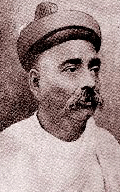| Bal Gangadhar Tilak (1856 - 1920) |
|
Lokmanaya Bal Gangadhar Tilak was born into a cultured, middle-class Brahman traditional family in Ratnagari in 1856. His father Gangadhar Pant was a school teacher. After obtaining a university degree, Tilak went to study Law but then decided to teach mathematics in a private school in Pune (Poona). Teaching in School became the foundation of his Political Career. He developed the school into a university college after founding the Decca Education Society in 1884. The aim was to educate the masses especially in English Language and to awake the political consciousness of the people.
|
 |
He started to publish two weekly newspapers: Kesari ("The Lion"), published in Marathi, and The Mahratta, published in English. Through these newspapers Tilak became widely known for his bitter criticisms of British rule and also of those moderate nationalists who advocated social reforms along Western lines and political reforms along constitutional lines. Tilak sought to widen the popular nationalistic movement, which at that time was confined to the upper class Hindus. He revoked Hindu traditions and religious symbolism by organizing two important festivals.
Tilak's activities soon brought him into conflict with the British government, which prosecuted him for sedition and sent him to jail in 1897. The trial and sentence earned him the title Lokamanya ("Beloved Leader of the People"). In Mandalay jail, Tilak settled down to write his magnum opus, the Bhagawadgita-Rahasya ("Secret of the Bhagavad-Gita"), an original exposition of the most sacred book of the Hindus.
On his release in 1914, on the eve of World War I, he once more plunged into politics and launched the Home Rule League with the rousing slogan "Swarajya is my birthright and I will have it." In 1916 he rejoined the Congress and signed the historic Lucknow Pact, a Hindu- Muslim accord, with Mohammed Ali Jinnah, the future founder of Pakistan. Tilak visited England in 1918 as president of the Indian Home Rule League.
By the time Tilak returned home in 1919 to attend the meeting of the Congress at Amritsar, he had mellowed sufficiently to oppose Gandhi's policy of boycotting the elections to the legislative councils established as part of the Montagu-Chelmsford reforms. Instead, Tilak advised the delegates to follow his policy of "responsive cooperation" in carrying out the reforms, which introduced a certain degree of Indian participation in regional government. But he died before he could give the new reforms a decisive direction. In tributes, Mahatma Gandhi called him "the Maker of Modern India".
|
|
| |
| Category filed under: Political |
|
|